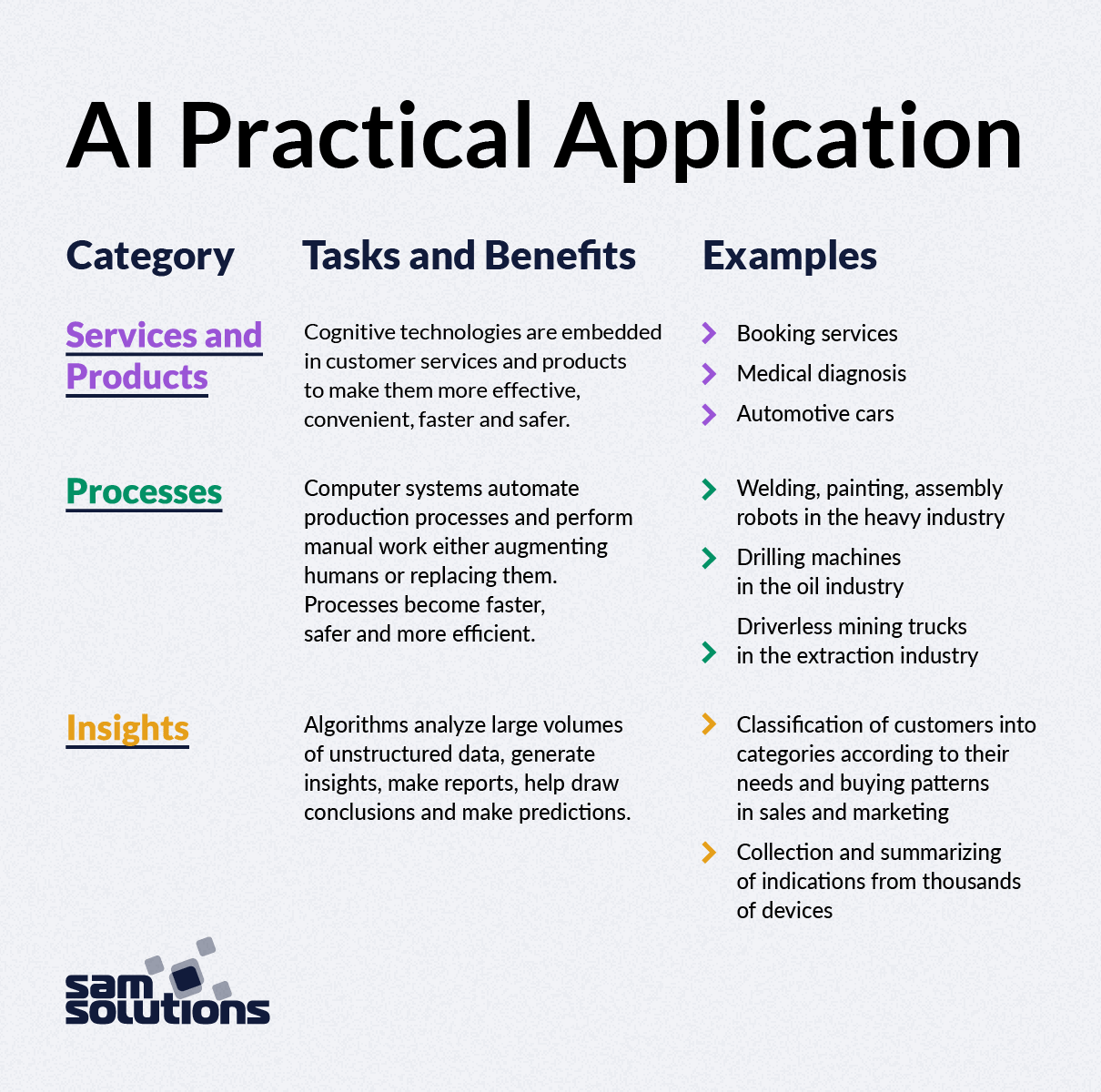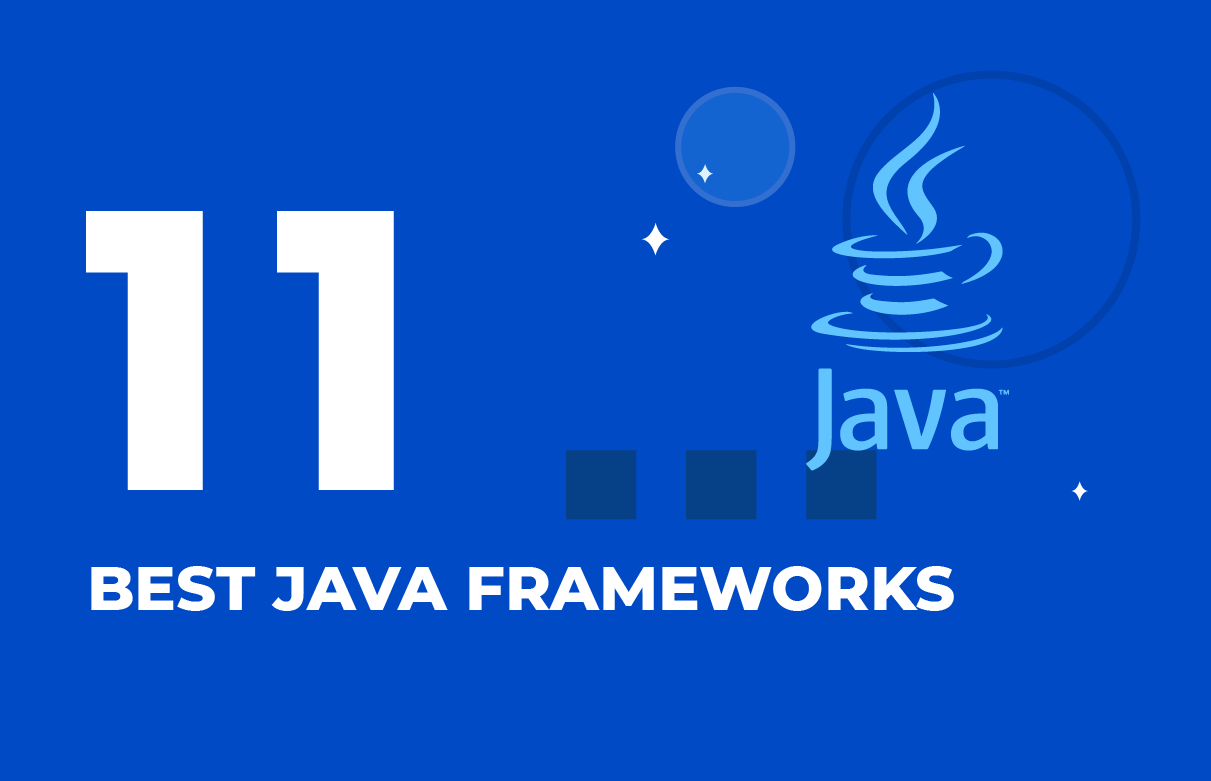Artificial intelligence has been a thrill for the world’s minds for decades. You can find AI prototyping in numerous science fiction books and movies. Today, AI algorithms are absolutely real and serve various practical purposes. In this blog post, we are talking about programming languages (Java in particular) used for artificial intelligence program development.
Inspiring AI Statistics
The quest for the creation of an artificial brain was inspired by the natural processes of the human brain. Gradually, the idea turned into a scientific concept and triggered the creation of practical intelligent technologies. As of now, AI developers have produced some great results. Take, for example, AlphaGo — a computer program that beat all human professional players while playing the most difficult board game Go.
The power of AI technology is still inconceivable. Its potential possibilities make more and more companies implement cognitive technologies into their processes.
Forecasts of experts regarding the AI market development are quite optimistic. IDC predicts that worldwide spending on artificial intelligence systems will reach $79.2 billion by 2022, while according to Statista, revenues will actively grow and reach $59 billion by 2025.

Source: Statista
Billionaire tech entrepreneur Mark Cuban is sure that the leading countries are currently in an AI race, and the winner who masters the technology will control the world.
AI Practical Application
Artificial intelligence is an umbrella term that encompasses multiple technologies: machine learning and reasoning, deep learning, neural networks, natural language processing (NLP), biometrics, chatbots, digital twins, computer vision, voice recognition and generation, and more.
These technologies can be applied in almost every industry, from sales and healthcare to manufacturing and aerospace, bringing significant changes and creating new business models. AI practical application in different organizations can be divided into three categories:
- Services and products
- Processes
- Insights

Artificial Intelligence Programming Languages
Artificial intelligence is a huge and growing scientific field. The development side of AI solution s is rather sophisticated and may require various tools and languages. It is really hard to determine the best programming language for AI because every company has its particular requirements for each specific project.
Among the wide range of programming languages, there are both specialized languages used for specific AI technologies, and general ones used for more common AI development. The choice of a coding language depends on functional requirements for the needed AI software.
Specialized Languages
IPL (Information Processing Language) was the first higher-level language created for AI purposes in 1956. Modern developers use some IPL feature s, such as lists, recursion, higher-order function s, symbols and generators.
AIML (Artificial Intelligence Markup Language) is based on XML and is used to build natural language agents or chatbots. It consists of categories that contain patterns of user inputs and templates of possible responses to patterns. Categories form the fundamental unit of knowledge for this language.
Smalltalk is an object-oriented programming language with incredibly simple syntax created during the 1970s and used for AI programming. Nowadays, Smalltalk is still popular among developers. Though the community is pretty small, it regularly releases libraries for neural networks, NLP, image processing, genetic algorithms, and more.
General Languages
Python is the leader among AI development languages. It has simple high-level syntax and a large variety of libraries. Python supports object-oriented, functional and procedural styles of programming. With Python, you can build neural networks and machine learning solutions perfectly, as well as test algorithms and solve NLP issues.
C++ is one of the fastest languages and can suit high-speed AI programs flawlessly. C++ works on the basis of object-oriented principles. It provides a high level of abstraction and a standard template library (STL) collection. It’s mostly used for machine learning and neural network building.
LISP is the second-oldest high-level programming language in the world. It’s still widely used in machine learning and inductive logic projects due to its unique features:
- The possibility to create a domain-specific level of abstraction
- Adaptability to customer problems
- Fast prototyping capabilities
- Efficient coding due to compilers
- Automatic garbage collection
- Support for symbolic expressions
- Interactive evaluation of components and recompilation of files while the program is running
Prolog is a declarative coding language, which means that the logic of any program is described by facts and rules. In the artificial intelligence field, Prolog can create expert systems and logic programs for solving problems. The main features are pattern matching, tree-based data structuring, rapid prototyping and automatic backtracking.
As you see, it may be a real challenge to identify the best programming language for artificial intelligence.
Java and Artificial Intelligence
A single, individual language for artificial intelligence has not been invented yet. Nevertheless, developers achieve great results using existing tools.
In many use cases, Java can be named the best language for AI projects. In general, it is one of the most loved and commonly used by programmers languages. If we take Java artificial intelligence programming, it is mostly used to create machine learning solutions, neural networks, search algorithms, genetic programming and multi-robot systems.
Java is object-oriented and scalable, which are must-have features for AI projects. Virtual machine technology makes Java portable, maintainable and transparent. It enables you to build a single app version that will run on all Java-supported platforms adding value to your business.
Since artificial intelligence is tightly connected with algorithms, one more point in favor of Java in AI programming is the ability to code different types of algorithms.
Java is a good choice for large-scale projects. It has a built-in garbage collector that automatically deletes useless data, facilitates visualization and incorporates Swing and Standard Widget Toolkit. These tools create appealing graphics and interfaces.
One more strong point is the substantial Java community with millions of members worldwide. Even a beginner can easily learn and create effective solutions as there is always someone who can answer your questions. Moreover, thousands of useful tutorials are available on the Internet for free.
However, in some terms, Java loses out to other languages. It has a slower execution speed and a higher response time as compared to C++. Though Java is multi-platform, it requires significant adjustments of software and hardware to work on older platforms. As of now, Java is an immature AI language, and ongoing developments are being carried out.
Advantages:
- Scalable
- Cross-platform
- Easy to learn and use
- Easy to debug
- Easy-to-code algorithms
- Built-in garbage collector
- Swing and Standard Widget Toolkit
- Provides better user interaction
- Simplified work with large-scale projects
- Reliable community
- Multiple free tutorials
Disadvantages:
- Slower than C++
- Require changes when runs on older platforms
- Immature AI language
No language can offer you the ideal value of your time and effort, but Java is striving for perfection. Programming AI in Java has more benefits than disadvantages, so you can safely use it to develop intelligent products.
How to Program AI in Java
To start implementing AI, you should have the basic knowledge of traditional algorithms and concepts. Learn them through online courses, specialized books and websites. The theoretical background of AI is necessary to use Java AI libraries that are extremely helpful for developers.
AI Libraries in Java
There is a great number of Java AI libraries. Take a look at the list of frameworks and platforms for the most popular fields.
For Expert Systems
Apache Jena — a framework to create web and linked data applications.
PowerLoom — a platform to build knowledge-based applications and reasoning systems.
d3web — a reasoning engine with many algorithms to solve given problems.
Eye — a reasoning engine to perform semi-backward reasoning.
Tweety — a collection of frameworks for logical aspects of AI and knowledge representation.
For Neural Networks
Neuroph — an open-source framework for neural network creation.
Deeplearning4j — a deep learning library for JVM that also provides API for neural network creation.
For Natural Language Processing
Apache OpenNLP — a toolkit to process the natural language text.
Stanford CoreNLP — a framework to perform NLP tasks.
For Machine Learning
Java-ML — a collection of machine learning algorithms.
RapidMiner — a data science platform that provides machine learning algorithms through GUI and Java API.
Weka — a collection of machine learning algorithms.
Encog — a collection of advanced algorithms.
For Genetic Algorithms
Jenetics — an advanced genetic algorithm.
Watchmaker — a framework for implementing genetic algorithms.
ECJ 23 — a research framework with support for genetic algorithms.
JGAP (Java Genetic Algorithms Package) — a genetic programming component.
Eva — a simple OOP evolutionary algorithm framework.
For automatic programming
Spring Roo — a lightweight developer tool.
Acceleo — a code generator for Eclipse which creates code from EMF models.
Our Java Developer Volha Shyrayeva has a personal recommendation for the most suitable AI library in Java. Find our expert’s opinion below.
OpenCV is an important Computer Vision library for Java. It is written in C++ and adapted to call functions in Java, Python, and other languages from DLL. OpenCV is the “number one” library for all Computer Vision engineers.
It helps users operate with images. Image preprocessing and post-processing is usually done using this library. Moreover, OpenCV contains a huge number of computer vision algorithms and optimization techniques. For instance, we can classify our input data with different clusterization and classification algorithms from OpenCV (e. g. Support Vector Machine [SVM] or K Nearest Neighbours [KNN]). Or we can extract key points from images with classical algorithms used for finding features in the image.
In addition, OpenCV contains classical morphological transformations and other core algorithms of image processing. We can even perform motion object detection and tracking algorithms with this library. And finally, OpenCV allows us to train the Neural Network in an arbitrary environment. Then we can load and use it in a different environment.
Make Your Business Intelligent
There’s no definitive answer as to what tools are better for AI projects. Programming languages that are used to build cognitive applications vary significantly. Each language is created with consideration for different requirements of AI technologies. One language is better suitable for one application, but not a good fit for others.
We develop highly customized Java-based solutions for clients across countless industries
Artificial intelligence programming in Java, nevertheless, can be considered as the golden mean: Java offers most of the necessary features for intelligent product development.
In any case, intelligent software can make your business flourish, regardless of the language it is written in.
SaM Solutions has a great team of Java developers, many of them are certified specialists. If you intend to automate your business processes by introducing smart technologies or want to create intelligent products, we are ready to help. You can hire our programmers for outstaffing or fully outsource Java project development to SaM Solutions. With us, you can reduce your expenses and be at the cutting edge!



















 The Latest 15 Information Technology Trends in 2024
The Latest 15 Information Technology Trends in 2024 Top 10 Embedded Software Development Tools
Top 10 Embedded Software Development Tools IaaS vs. PaaS vs. SaaS: What’s the Difference?
IaaS vs. PaaS vs. SaaS: What’s the Difference? IoT Development: Top 15 Internet of Things Tools and Platforms in 2024
IoT Development: Top 15 Internet of Things Tools and Platforms in 2024 10 Examples of Predictive Analytics
10 Examples of Predictive Analytics












 AWS Java Development: A Comprehensive Guide
AWS Java Development: A Comprehensive Guide What Is Headless CMS?
What Is Headless CMS? SAP Commerce Cloud vs Shopify: A Detailed Comparison for Businesses
SAP Commerce Cloud vs Shopify: A Detailed Comparison for Businesses Java and Cloud Development: An Ideal Pairing
Java and Cloud Development: An Ideal Pairing Component-Based Architecture in Software Engineering: A Comprehensive Guide
Component-Based Architecture in Software Engineering: A Comprehensive Guide
Good information. Lucky me I ran across your blog by accident (stumbleupon) and found so much about Java. I have bookmarked it for later!
Your Way Of Explanation was good. You add some valuable points. Java is often recommended as the first programming language that new developers need to learn before learning other programming languages. Java language has advantages over other programming languages in that it can be able to run on any platform and any devices. Being able to run on many devices was what the developers had in mind when creating the Java programming language.
Very true you are and 100% correctly said that Java is best language for the AI, and your blog is very useful and interesting. Keep doing it. Thanks for sharing it.
As I am engineering student and i am very fond of coding basically in java programming.
And i want to make career in java so its really me helpful to me.
Thanks for sharing your valuable thoughts.
To start implementing AI, you should have the basic knowledge of traditional algorithms and concepts. Learn them through online courses, specialized books, and websites.